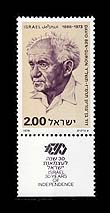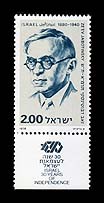|
David Ben-Gurion
The first Prime Minister and Defence Minister of Israel, the man whose voice, on May 14, 1948, announced to the world the rebirth of an ancient nation, was born David Green in 1886 in Plonsk, Poland. He immigrated in 1906 and soon became one of the leading labour leaders. In 1912 he went to Constantinople to study law; he returned to Palestine in 1914 but was expelled by the Turks in 1915 and went to the U.S.A. He helped to forni the Jewish Legion and came back to Palestine as a volunteer with the British army. After the war he was a founding member of the Histadrut, and its Secretary-General from 1921 to 1933. Elected Chairman of the Zionist Executive in Jerusalem, he became the main spokesman of the Jewish population in its struggle against the Mandatory authorities. After World War II, and in view of the Holocaust, his demands for Jewish statehood became more urgent and insistent as the hour of decision in the Middle East drew closer. As head of the provisional government which proclaimed the creation of the State of Israel, he led the young state to victory in the War of Independence, and it was he who organised the I.D.F., introduced. uniform education, proclaimed Jerusalem's status as the Nation's capital, launched the mass immigration of the early fifties and by his personal example of settling in Sede Boqer, gave impetus to the settlement and development of the Negev. David Ben-Gurion resigned from the government in 1953, returning in 1955 first as Minister of Defence and later as Prime Minister, leading the nation in the Sinai campaign. He retired from the premiership in 1963 and gave up his Knesset seat in 1970. On December 1973 he died and was laid to rest in Sede Boqer.
Ze'ev Vladimir Jabotinsky
Leader of the World Union of Zionist Revisionists, founder of the Jewish Legion. the Betar youth organization and the New Zionist Organisation, Jabotinsky was born in Odessa in 1880 and admitted to the bar in Czarist Russia. Early in his student days he acquired a reputation as a writer and orator of unusual power. A follower of Herzl from the beginning, he became identified with political Zionism and during the First World War propagated the idea of creating a Jewish fighting force to help liberate Palestine from the Turks. As a serving officer in the British army, he remained in the country at the close of the war and in 1920, at the outbreak of the Arab riots, he organised a Jewish self-defence corps. Arrested by the British, he was condemned to 15 years hard labour but released after a few months in Acre jail.
He was one of the deputies to the first national assembly of the Jews in Palestine and later joined the Zionist Executive in London but resigned because of differences with Weizmann. He settled in Palestine and travelled all over Europe propagating his ideas. He left the country in 1929 to attend the 16th Zionist Congress in Zurich and was refused re-entry into Palestine. He later settled in Paris and died in 1940 in New York. In 1964 his remains were brought to Jerusalem and reinterred on Mt. Herzl.
In addition to his Zionist activities, Jabotinsky found the time to be a brilliant and versatile writer, journalist, poet and translator who rendered Bialik into Russian and Dante into Hebrew, wrote the novels "Samson the Nazarite" and "The Five" as well as the first Hebrew Atlas.


